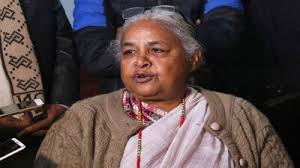Nepal Appoints First Woman Prime Minister Amid Political Unrest and Violence
Nepal makes history by appointing its first woman Prime Minister even as the nation grapples with deadly political unrest and violence. Read about the challenges and significance of this landmark moment.
By: Bharat Daily Samachar Date: 13 Sep,2025
Nepal Appoints First Woman Prime Minister Amid Political Unrest and Violence
Kathmandu is witnessing a historic yet turbulent moment. For the first time in its history, Nepal has appointed a woman as Prime Minister. The decision, which could have been a unifying milestone for the nation, has instead unfolded against the backdrop of violent unrest and political deadlock. While many hail this move as a breakthrough in Nepal’s democratic journey, others worry that the continuing turmoil may overshadow the significance of this achievement.
A Historic First for Nepal
Nepal’s newly appointed Prime Minister has broken centuries of political tradition in a country that has long been dominated by male leaders. For millions of women in Nepal, this appointment represents a moment of pride and empowerment. Gender equality has been a pressing issue in the nation, where women have historically struggled to secure equal representation in politics, employment, and social leadership roles.
Her rise to power is not only symbolic but also a statement that Nepal is ready to embrace inclusivity in governance. Civil society groups and women’s rights activists have celebrated the decision, calling it a step toward building a more representative democracy.
Unrest Overshadows the Achievement
Unfortunately, this historic announcement comes at a time when Nepal is in turmoil. In recent weeks, violent clashes have erupted across major cities, including Kathmandu, Pokhara, and Biratnagar. Protesters, many of them young Nepalis, have been demanding political reforms, fair representation, and stronger economic measures to tackle unemployment and inflation.
The protests escalated into violent confrontations with police forces, leading to casualties and widespread property damage. Just days before the Prime Minister’s appointment, a tourist bus carrying Indian passengers was attacked in Kathmandu, highlighting the seriousness of the situation.
For many citizens, the celebration of a female Prime Minister is bittersweet. While they acknowledge the importance of this milestone, their immediate concerns are focused on peace, stability, and safety.
The Political Deadlock
Nepal has been struggling with political instability for years, often caused by power struggles between parties and coalition governments. The appointment of the new Prime Minister follows weeks of deadlock after the collapse of the previous interim government.
While her leadership brings a fresh perspective, the challenges are immense. She must not only prove her political strength in navigating a fractured parliament but also manage growing unrest in the streets. Experts say her ability to bring stability will determine whether her appointment will be remembered as a true turning point in Nepal’s history or just a symbolic gesture.
Regional and International Reactions
India, as Nepal’s closest neighbor, has been watching developments carefully. Given the shared borders, cultural ties, and economic cooperation, India has a vested interest in Nepal’s stability. Indian officials have congratulated Nepal on appointing its first female Prime Minister while also expressing concern over the violent protests.
International observers, including rights organizations and global leaders, have also welcomed the historic decision. However, they stress that the success of her tenure will depend on whether she can bring calm to the streets and push for meaningful reforms.
Challenges Ahead
The road ahead for Nepal’s new Prime Minister is far from easy. Among her most pressing challenges are:
Restoring peace and law and order after weeks of violent protests.
Uniting fractured political parties and ensuring stable governance.
Addressing economic concerns, particularly rising unemployment and cost of living.
Rebuilding international confidence in Nepal’s tourism sector, which has taken a severe hit due to unrest.
Strengthening women’s participation in politics, beyond symbolic leadership.
Voices from the People
Reactions on the streets of Kathmandu reflect both hope and skepticism. “It is inspiring to see a woman finally lead our country,” said a 22-year-old student. “But what use is history if our lives remain unsafe and unstable?”
Others expressed cautious optimism, believing that a female leader may bring a new approach to politics, one rooted in inclusivity and dialogue rather than confrontation.
What This Means for Nepal’s Future
Nepal’s first woman Prime Minister represents a powerful symbol of progress in a country that has endured years of political upheaval. However, the ongoing unrest poses a serious threat to this momentum. If she can harness this historic moment to bridge divides and introduce reforms, her leadership could reshape Nepal’s democratic future.
For now, Nepal stands at a crossroads — one path leads to empowerment, stability, and reform, while the other risks deeper unrest and instability. How the country moves forward under its first female Prime Minister will be closely watched not only in South Asia but also around the world.


